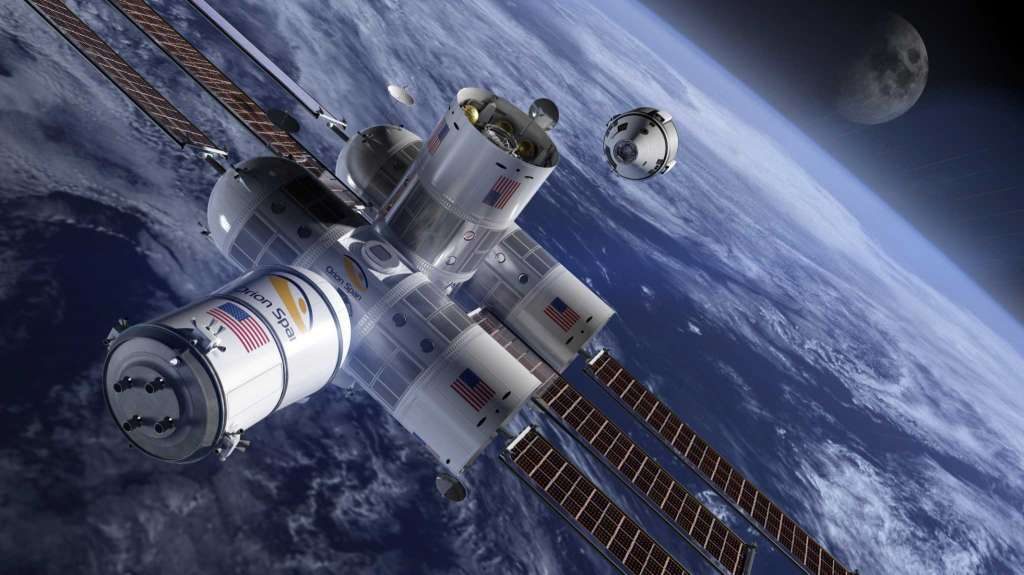New Luxury Space Hotel Blasts Off With Houston Backing and Knowledge: It’s $9.5 Million for a 12 Day, Out of this World Stay
BY Annie Gallay // 04.06.18The first-ever space hotel will be ready for its first guests in 2022. (All photos courtesy of Orion Span.)
As we take our trips and check into the Marriotts and Hiltons of the world, a Houston start-up space tech company is drawing up the plans for a new luxury hotel that’s out of this world.
Designs for the first-ever space hotel are underway. Orion Span revealed the plans at the Space 2.0 Summit in San Jose, California, on Thursday. The Houston and Silicon Valley-based company is trading check in for take off with Aurora Station, with the first space stay projected for as soon as 2022.
The wait list is now open for the 12-day stay in space. The hotel will host up to six people at a time — including two professional astronauts, one flight-oriented and one hospitality-oriented.
For a cool $9.5 million, with a fully refundable $80,000 deposit, hotel guests can expect a little more than turndown service and a chocolate on their pillow. Think floating in zero gravity, experiencing virtual reality in the holodeck, and growing your own food to bring back to Earth as a souvenir.
“The core product here we’re selling is an experience for people. An authentic astronaut experience,” Orion Span CEO Frank Bunger tells PaperCity.
Did we forget to mention the views you get when you orbit Earth every 90 minutes? The space tourists can take in 16 breathtaking sunsets and sunrises every 24 hours. And the station’s named for its amazing vantage point for viewing the aurora borealis, or Northern Lights. So much for pay-per-view.
But you can expect some traditional amenities, like Wi-Fi on board to keep you connected with your gravity-bound friends and family 200 miles below. Just don’t plan to hit the mini bar.
“We’re figuring out how to best do alcoholic consumption in zero gravity,” Bunger says, laughing.
Although a price just south of $10 million seems like a pretty penny, Bunger sees it as far more affordable than traditional space tourism. The price could even go down. In the past, private citizens have paid $20 million to $40 million per trip to the International Space Station, according to Space.com.
You can thank Orion Span’s commitment to streamlining for the “discount”.
“What we’ve been focusing on is a way to simplify space craft systems,” Bunger says. Orion Span was determined to move away from the complicated systems seen in stations like The International Space Station, even eliminating elements when possible. Effort went into moving parts on the external area of the space station.
So say so long to visions of bell hops wearing red caps on top of their space helmets. On this clean-cut station, there’s no need for space suits and no need for an airlock. That means less training and less programming. All of these simplifications speed up that taut timeline.
“It’s an aggressive timeline. We want to move fast on things,” Bunger says. Orion Span are certified speedsters — the idea for Aurora Station came to the company just a year ago.
And if you think design and build-out are fast, consider the time it will take guests to shuttle from the third rock from the sun to the station. The rocket launch shoots you up there almost before you can say, That’s one small step for man. “The actual trip itself is 30 to 40 minutes,” Bunger says.
The configuration will be two hotel suites, which can be reconfigured to four as needed. Bunger likens the volume of the entire space, at 43.5 feet long by 14.1 feet wide, to the cabin of a large private jet. Orion Span is aiming for a contemporary look, which has been historically challenging for space stations. Typical layouts have involved cables running across the floor and visible velcro.
“It’s pretty utilitarian. It’s not the most appealing aesthetic,” Bunger notes.
You can expect Aurora Station to be clean, modern, and to take advantage of the open space, no pun intended.
Stays at Aurora Station will primarily attract people who haven’t been to space before, Bunger anticipates.
“I think the appeal right now is that we’re living in a time when space is exciting again. The same way it was in the 1960s and 1970s,” Bunger says. “All of a sudden, commercial space flight is possible and viable.”
Prep is mandatory for the 12-day getaway, with a required three-month certification program. First, there’s a month-long course online, then a four to six-week training in Houston, and finally a session on the Aurora Station itself. The low-Earth-orbit modular space station will be constructed in the Houston area as well, which is known for its extensive spaceflight knowledge and experience.
Aurora Station is slated for a 2021 launch, with provider candidates like international space agencies, Blue Origin, and Elon Musk’s SpaceX. Agencies may even get opportunities to manufacture and perform zero gravity research at the station.
Space City Smarts
The project will take tens of millions of dollars to reach fruition. Two angel investors are funding it for now, and Orion Span is planning Series A financing within the coming months.
The central team is Bunger, chief technology officer David Jarvis, chief architect Frank Eichstadt and chief operating officer Marv LeBlanc. While Bunger lives in the Bay Area, the rest of the all-star team earned their space knowledge stripes here in Space City.
Jarvis is a human spaceflight engineer and payload developer with a background in the International Space Station operations and management. Eichstadt is an industrial designer who was principal architect on the ISS Enterprise Module. Marv LeBlanc is a formal general manager and program manager, and a veteran at NASA mission control and running operations.
Orion Span hopes that growth is on the horizon. The company considers Aurora Station just the first orbital community. The long-term vision is selling space in additional modules, called “space condos,” launched to link up with the original space hotel outpost.
The start-up isn’t alone in its space ambitions. Other companies like Bigelow Aerospace and Axiom Space see growing demand from national governments, private industry, space tourists and researchers. They plan to meet it by launching their own commercial space stations to the Earth’s orbit within a few years.
It’s rare that be our guest means they’ll take you on a space quest. Maybe Sci-Fi predictions aren’t so far off. The future is here.
























_md.jpeg)










